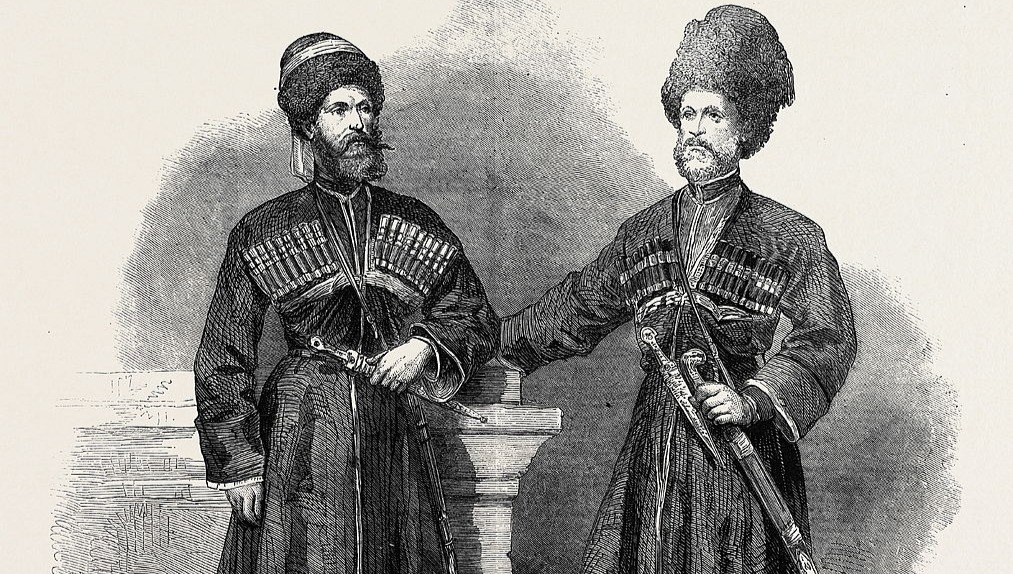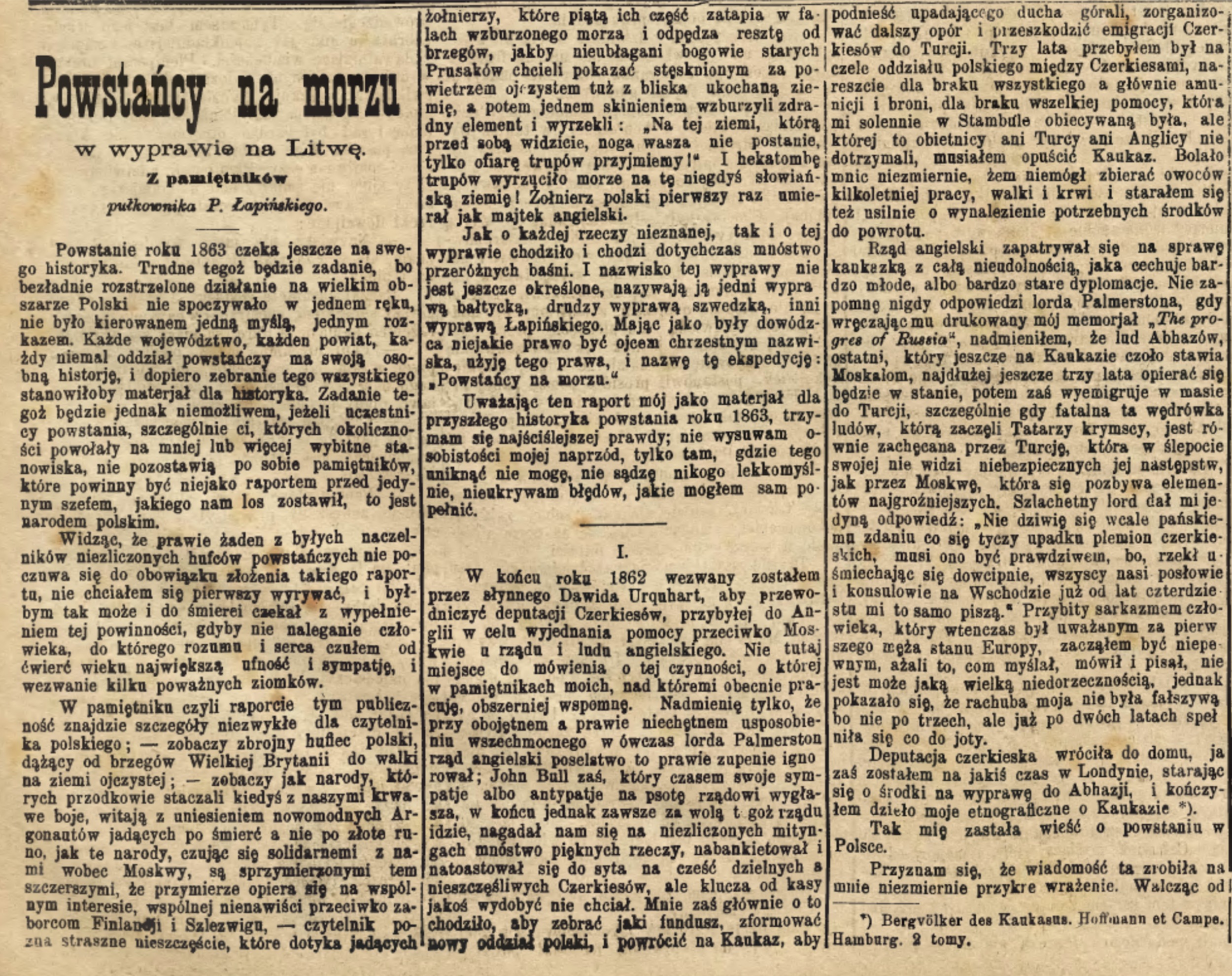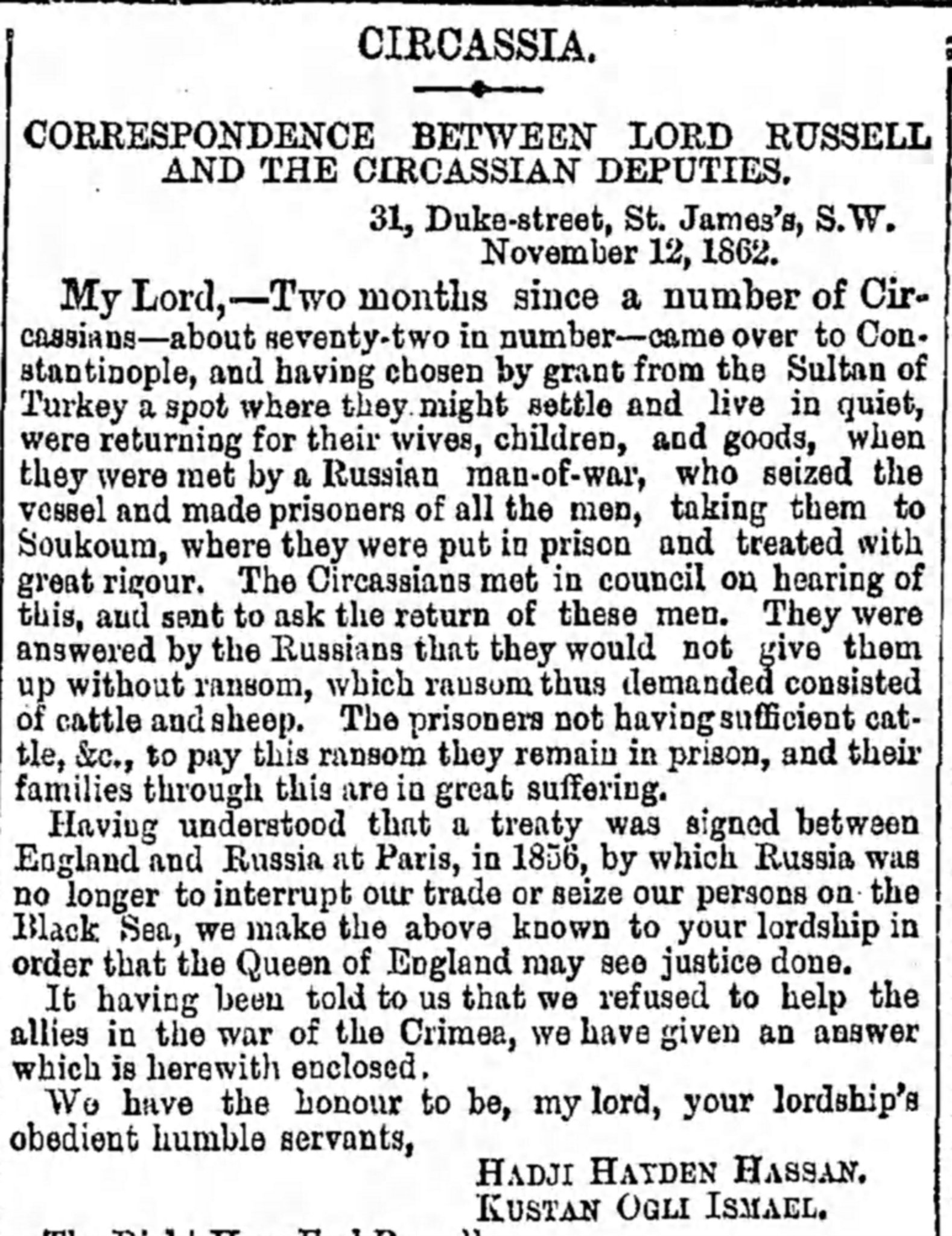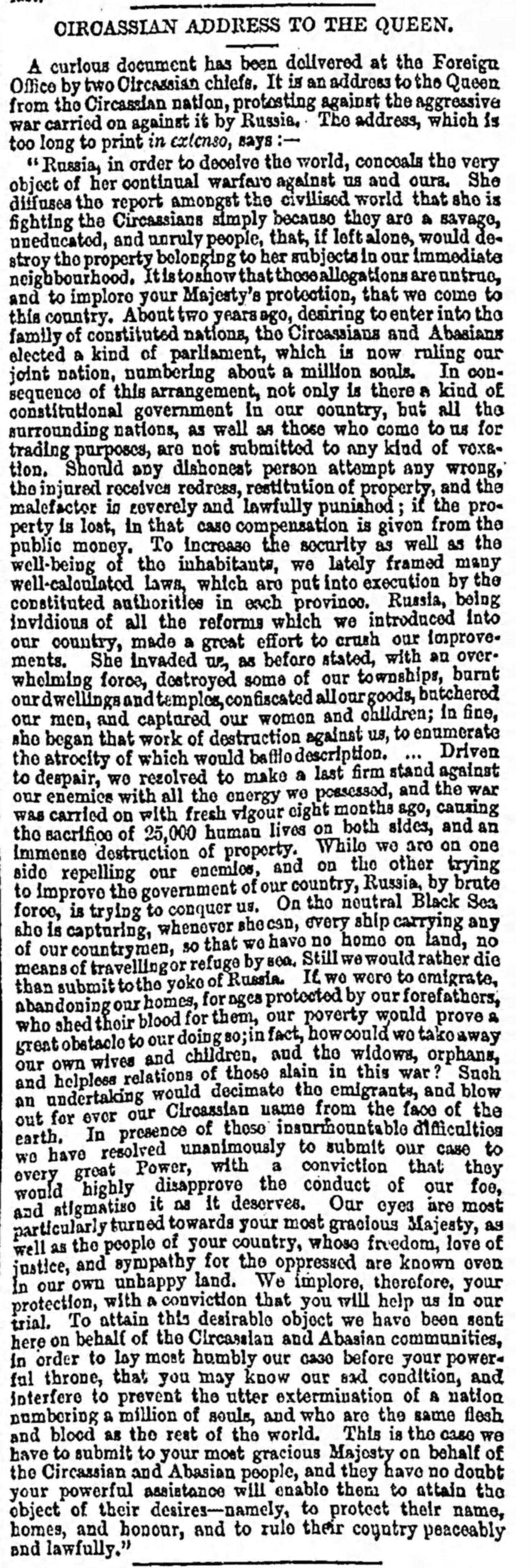Lapinski: Abkhaz people are the last in the Caucasus who still put up resistance to the Muscovites

Adyghe-Abkhaz deputies. Hadji Hassan Effendi and Constan Okhoo Ismael Effendi (Izmail Barakay-Ipa Dzapsh) (Right). The Illustrated London News (1862).
In June 1861, on the initiative of the Ubykhs, a 'mejlis' (parliament) was constituted not far from Sochi; it was known as 'The Great and Free Assembly'. The Ubykhs, the Circassian Shapsughs and Abadzekhs/Abzakhs, and the Abkhazian tribes of Ahchypsy, Ajbga as well as the coastal Sadzians strove to unite the mountain tribes into 'one huge barrage'. A special deputation from the mejlis, headed by Izmail (Ismael) Barakay-Ipa Dzapsh, visited a range of European states.
Active participation in the liberation struggle in the West Caucasus was taken by Polish revolutionaries who intended to raise simultaneously an Abkhaz-Circassian and Polish revolt against the Russian empire. Obsessed with this idea was Col. Teofil Lapinskij (1827-1886). At the end of 1862 he visited London at the head of an Abkhaz-Adyghean deputation. The deputation was received by the Prime Minister of England, Lord Palmerston. Lapinski delivered this short speech in his presence:
At the present moment, the Abkhazians are the sole tribe who are continuing to mount powerful resistance to Russia in the Caucasus. But even they have become exhausted under the weight of the unequal battle and can be expected to hold out in such conditions for at most another three years. Then they will inevitably follow in the tracks of the other Caucasian tribes: they will move to Turkey. Europe ought, with a view to weakening the northern colossus and keeping its army somehow occupied in the south, when a serious blow is also struck from the opposing side, to support the valiant Abkhazians, forestall their banishment from their native soil and thus save perhaps all the mountain-peoples of the area. To whom if not England, the principal naval power in the world, should this noble and strategic initiative belong in this case?.
Palmerston refused any kind of assistance: You are quite correct, Colonel, in your assessment of the Caucasus: tribe after tribe there is succumbing to the energetic pressure of Russia. All our ambassadors and consuls in the East have been informing me of this for some forty years. Where is the wisdom in the Abkhazians now doing the very same?. (See: Die Bergvolker des Kaukasus und ihr Freiheitskampf gegen die Russen, nach eigener Anschauung geschildert von Theophil Lapinski. Hamburg 1863)
The deputation set sail from the shores of England with nothing.
In 1878, an article was published from his diaries by Teofil Lapinski in Gazeta Narodowa, № 180: “Powstańcy na morzu w wyprawie na Litwę. Z pamiętników pułkownika T. Łapińskiego”. It mentioned his conversation with Lord Palmerston. Below is the translation from Polish of the second part of his article.
Click image to view full size:

Insurgents on the Sea in a journey to Lithuania. From the diaries of colonel P. Łapiński.
I.
At the end of 1862 I was summoned by the renowned David Urquhart, who invited me to head a delegation of Circassians who had come to the UK in order to secure from the English government and people help [in their struggle] against Moscow. There is no point in mentioning in this current work an episode which I will dwell on in greater detail in the memoirs that I am currently preparing. I shall say only that given the indifferent and almost negative attitude of the then omnipotent Lord Palmerston, the English government virtually ignored the Circassian delegation. For his part, John Bull [meaning the average Englishman – ed.], who sometimes communicates his sympathies and antipathies to the government but in the final analysis always acts as the government wishes, spoke many fine words to us at numerous meetings, enjoyed himself no end at banquets, pronouncing toasts to the valiant and unfortunate Circassians, but showed no desire to hand over the keys to the till. And that is precisely what I had in mind – to amass a specific sum, recruit a new Polish detachment and return to the Caucasus to strengthen the mountain-dwellers’ morale, organise future resistance, and prevent the emigration of the Circassians to Turkey. I had spent three years among the Circassians at the head of a detachment of Polish volunteers and finally, for lack of practically everything there could be a lack of, primarily arms, ammunition and other kinds of assistance which I had been so lavishly promised in Stamboul [Istanbul], but which neither the Turks nor the British provided and did not keep their word, I was forced to leave the Caucasus. I suffered incredibly from not being able to enjoy the results of three years of struggle and resistance and intensified my efforts to secure the means needed to return.
The English government approached the Caucasus question with all the clumsiness characteristic of either very young or very old diplomacies. I shall never forget Lord Palmerston’s response when, as I presented him with my published pamphlet “The Progress of Russia,” I mentioned that the Abkhaz people are the last in the Caucasus who still put up resistance to the Muscovites, that they are in a position to continue that resistance for three more years at the most, and will then emigrate en masse to Turkey, especially when that fatal resettlement of peoples begun by the Crimean Tatars is supported in equal measure by Turkey, which in its blindness cannot see its dangerous consequences, and by Moscow, which is struggling to rid itself of the most dangerous elements. The noble lord gave me the only answer: “I am not in the least surprised by your opinion concerning the decline of the Circassian tribes. It has to be right because,” he said mockingly, “all our ambassadors and consuls in the east have been writing the same thing to me for 40 years.” Dumbfounded by the sarcasm of the man who was considered the greatest statesman in Europe at that time, I began to have doubts whether what I was thinking, writing and saying was not a gross misunderstanding. But life demonstrated that my predictions were not wrong, because they came true not in three years, but in two.
The Circassian deputation returned home, while I remained in London for some time, attempting to get funding for a journey to Abkhazia, and I was completing my work on the Caucasus.* This is when the news of the Uprising in Poland reached me. I have to admit that those news saddened me greatly.
*Bergvölker des Kaukasus. Hoffmann und Campe, Hamburg, 2 Volumes.
Leeds Mercury, November 1, 1862.
Daily News, December 2, 1862.

Manchester Weekly Times and Examiner, October 4, 1862
